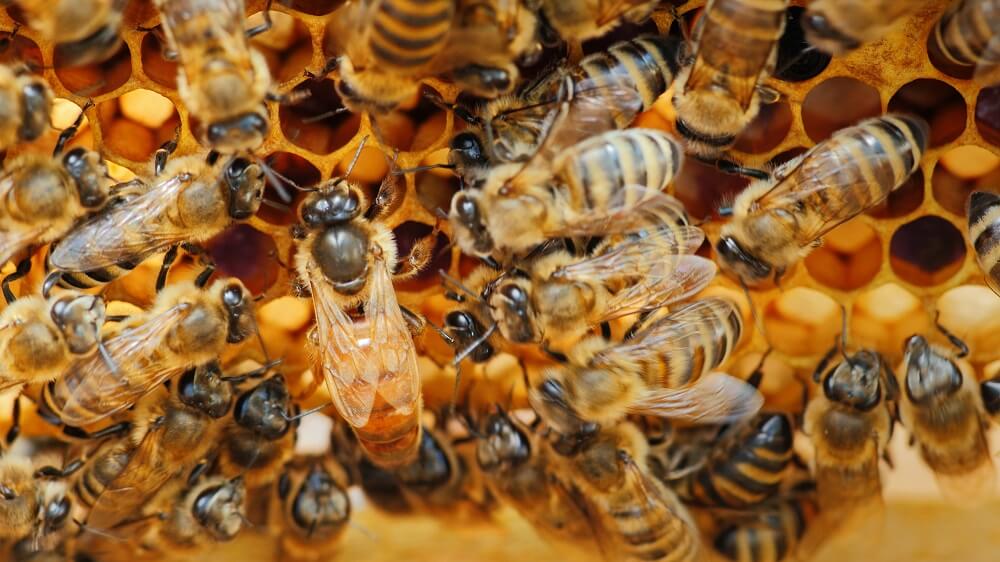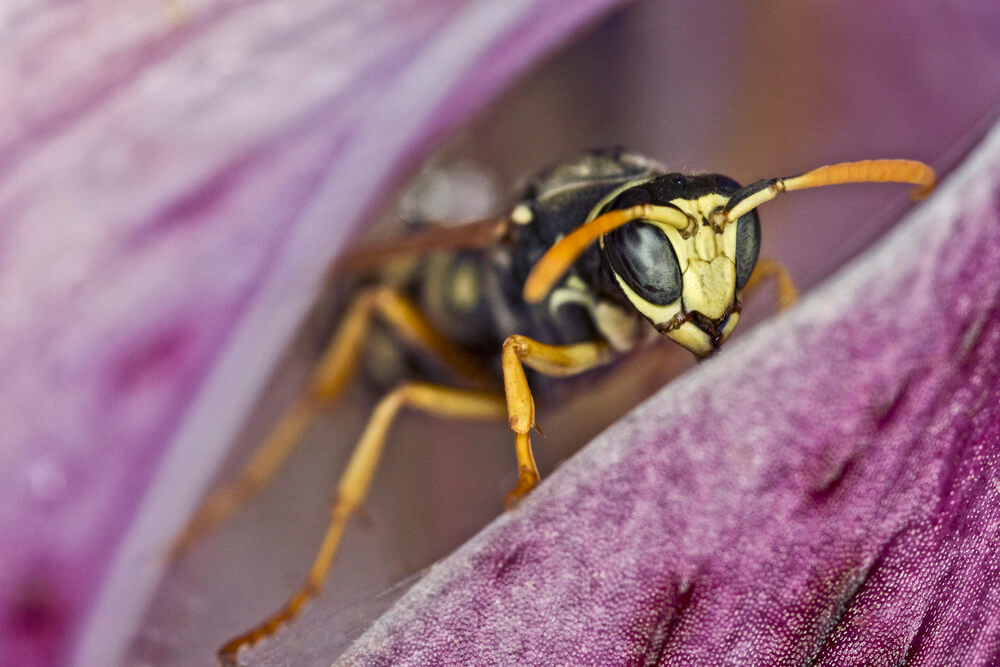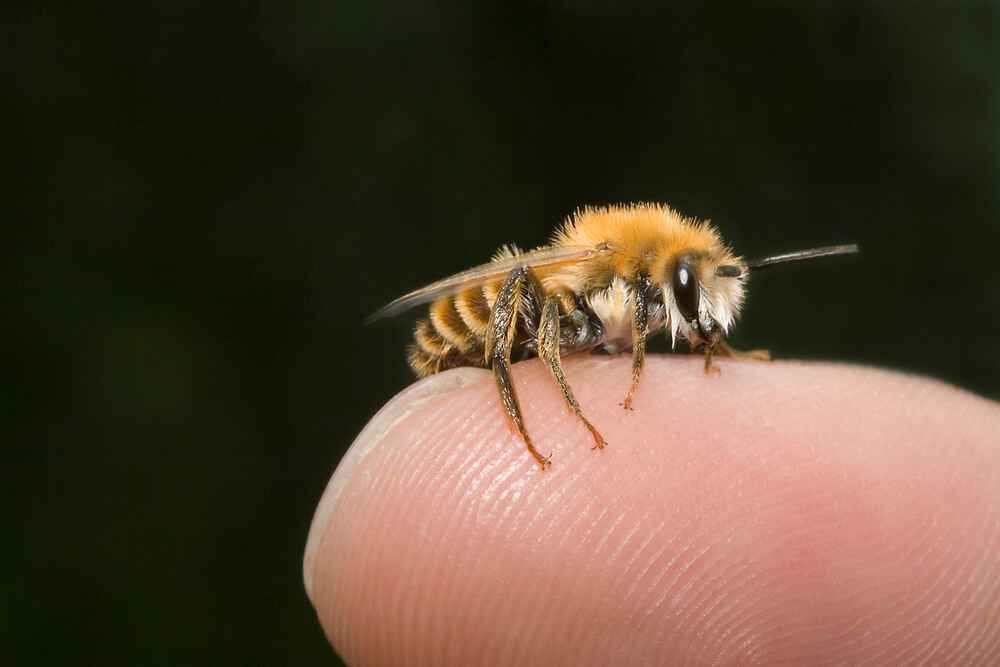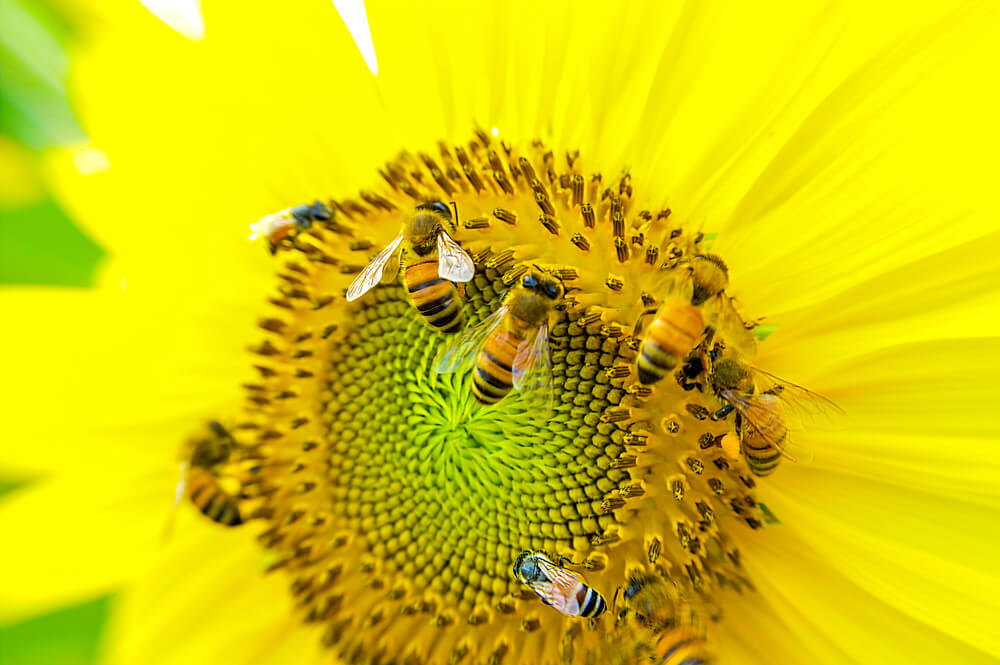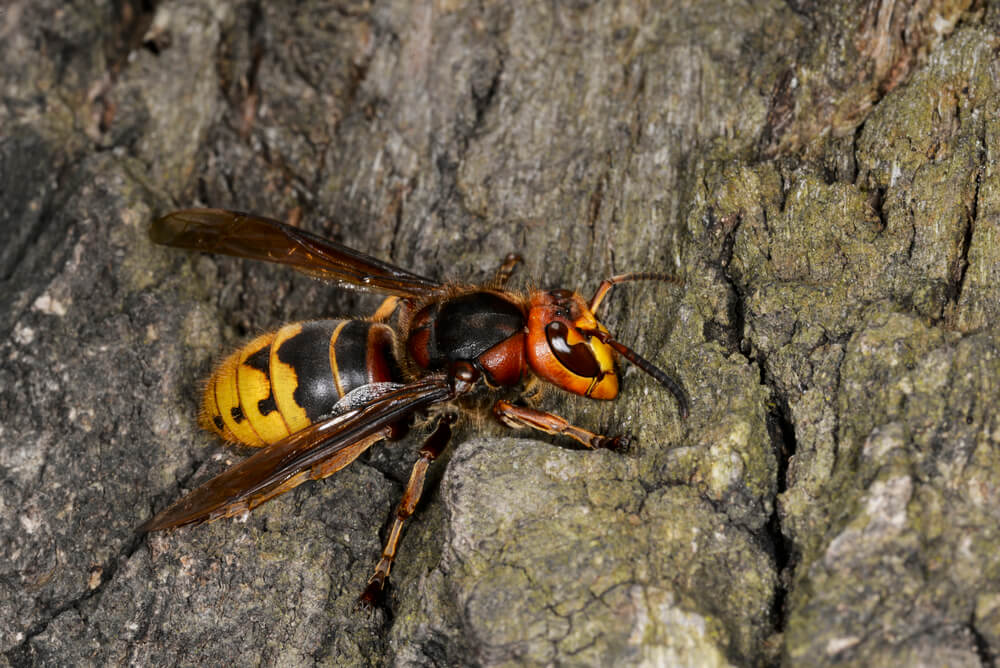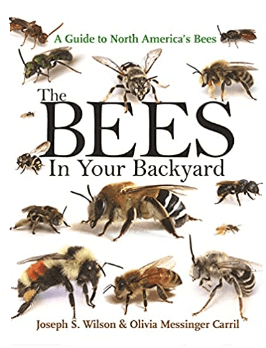Table of Contents:
Does a Queen Bee Sting?
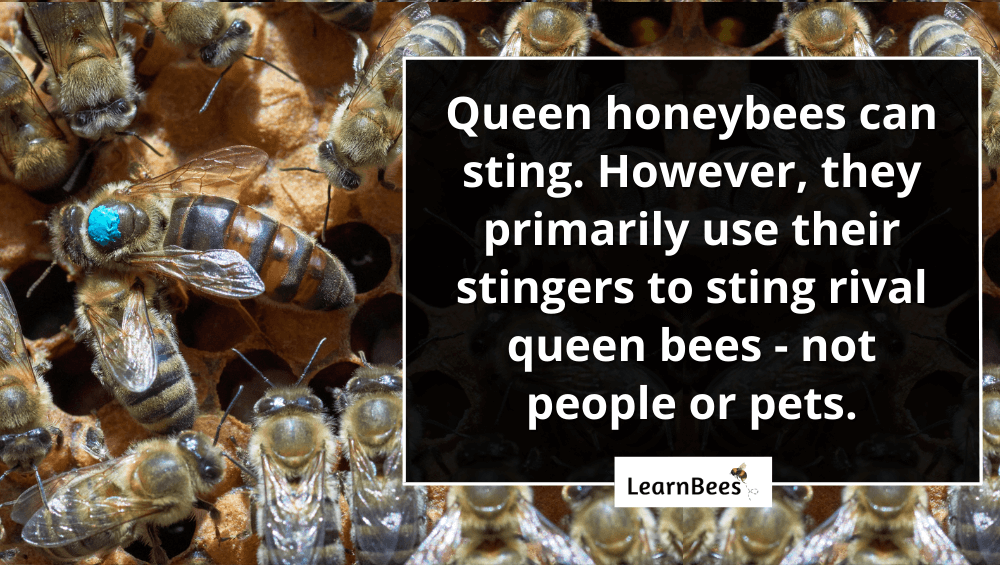
Queen bees have stingers and are fully capable of using them.
But it isn’t for what you might think.
A queen’s stinger isn’t used to sting humans, pets, or even other insects. Instead, queen honeybees use their stingers as a weapon to fight off other queens.
Here’s the thing:
There is (typically) only one queen per hive.
With that in mind, worker bees will start raising new queens if they feel their current queen is underperforming.
So what happens when the new queen hatches?
She tries to replace the old queen by killing her.
More specifically, the two queens repeatedly sting each other until one of them dies. The winner declares victory and claims the ‘queen’ title.
But as for people?
It’s extremely rare that a queen honeybee would sting someone.
For one, most humans have little to no contact with queen bees because queens rarely even leave their hives. They’re too busy inside the hives laying up to 2,000 eggs per day.
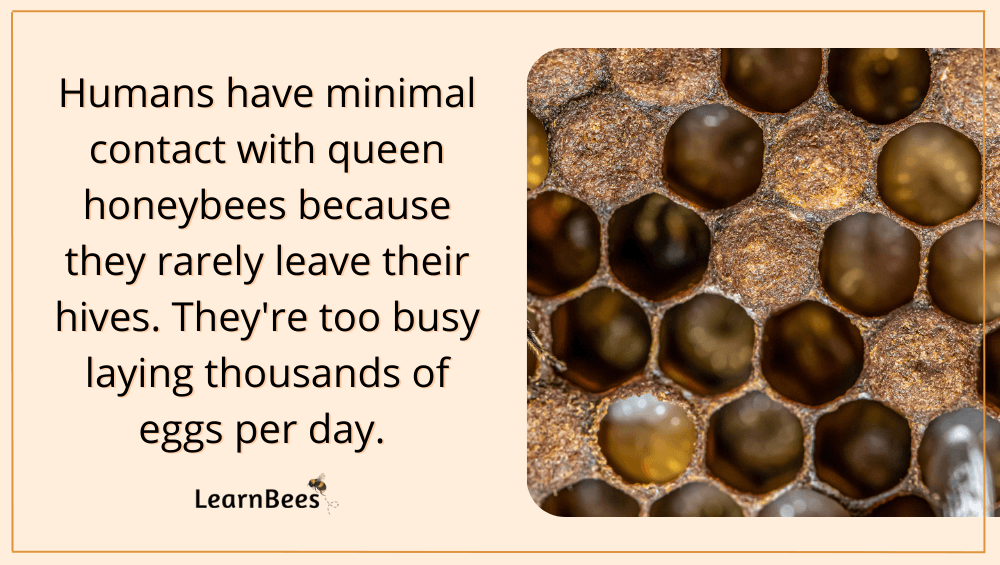
But why do queens lay so many eggs?
Simple.
An average of 1,000 worker honeybees die per day during the summer. To replace these daily losses, the queen spends most of her time laying eggs.
Secondly, the queen honeybee has little reason to leave the hive because the worker bees meet all her needs. She’s cleaned, fed, and protected by her colony.
So here’s the thing:
The next time you see a honeybee buzzing around a flower, you can be confident that it’s probably a worker bee instead of a queen bee.
With that in mind, some people – such as beekeepers – regularly work around queen honeybees. But most beekeepers I’ve spoken to have never been stung by a queen bee.
Of course, it can happen, but it’s rare.
Are Queen Bee Stings Worse?
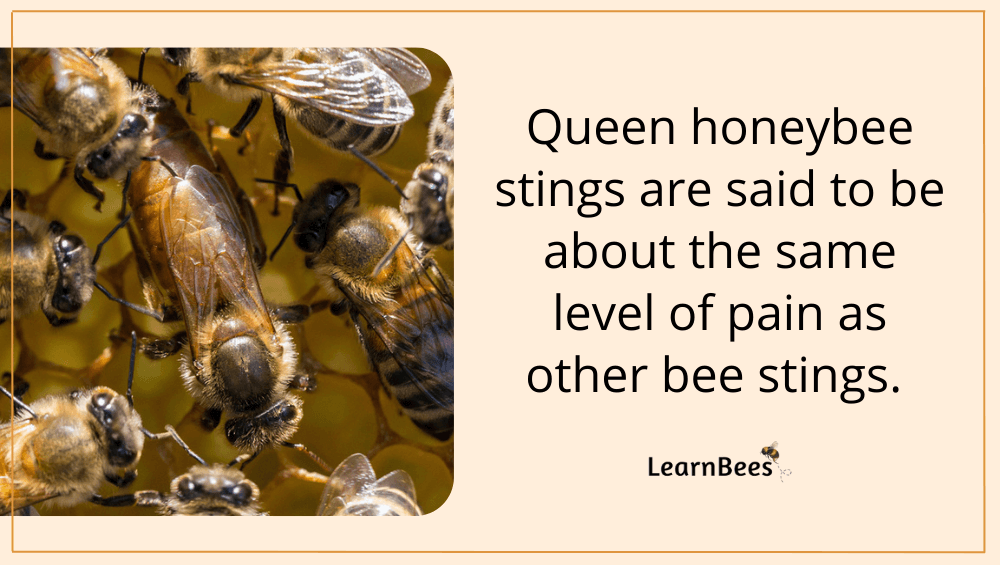
“Are queen bee stings more painful?” is the million-dollar question.
But this is a tricky question. Very few people have actually been stung by a queen bee. Remember, queens typically only use their stingers against rival queens.
However, I have known one beekeeper who experienced a queen honeybee sting. He said it felt no different than a sting from a worker bee.
But here’s the interesting part:
If they wanted to, queen honeybees could sting humans multiple times without dying.
But worker honeybees, on the other hand?
They aren’t so lucky.
Worker honeybees can only sting humans once because they lose their stingers in the process. The loss of the stinger fatally wounds the worker bee, causing them to die within minutes.
This is because worker honeybees have barbed stingers that ‘hook’ into our skin. As such, their stinger gets pulled out of their body once they fly away.
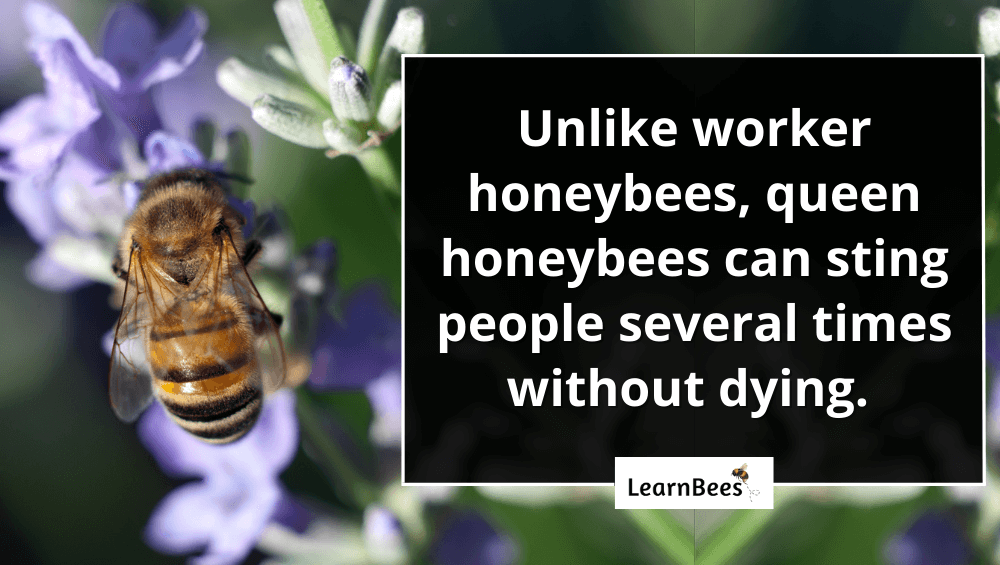
Queen honeybees are different.
They have smooth stingers that don’t get lodged into human skin. This allows them to sting multiple times without dying. So, in theory, one could argue that queen bee stings are worse because they can attack multiple times.
But as mentioned, the likelihood of getting stung by a queen bee is slim to none.
Despite popular belief:
Most bees are gentle creatures that only sting humans when they feel threatened. So unless you’re actively trying to harm a bee or its hive, there’s minimal risk of getting stung.
And the good news?
Bees are typically only territorial when it comes to their hive.
For example, I feel comfortable working in my flower garden while happy bees buzz around me. They’re away from their hive, so they have nothing to protect. They’re simply collecting pollen and nectar from flowers.
Will Worker Bees Sting if You Have the Queen?
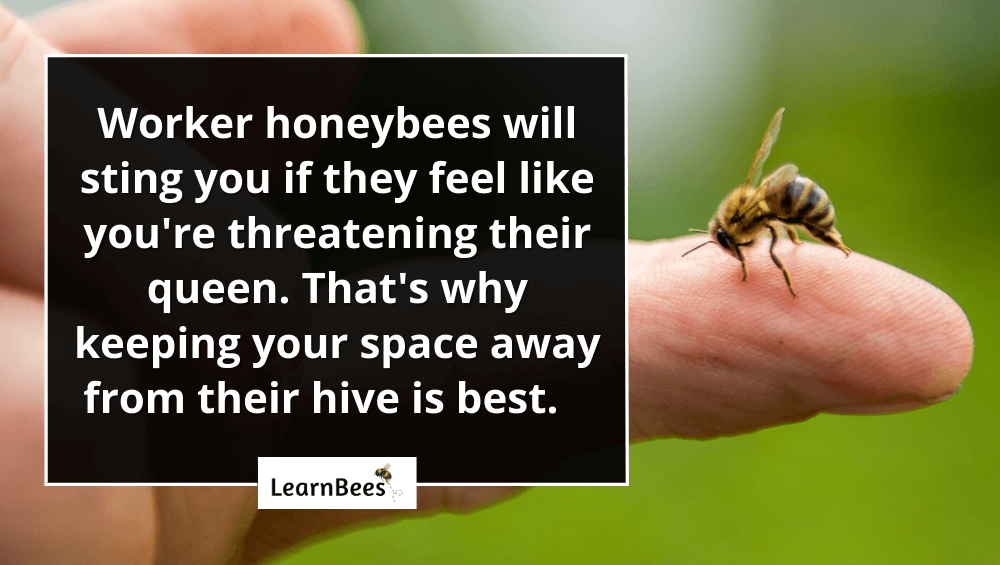
Yes, worker bees will sting you if they perceive you as a threat to their queen.
Remember:
Worker honeybees are the main line of defense for queen bees. Their job is to keep her alive, which means protecting her at all costs. The future of their colony rests on the queen.
Also, an established honeybee colony can be quite large.
For example, it’s not uncommon for a single honeybee hive to contain 50,000 – 60,000 bees. It takes many helping hands to produce beeswax, make honey, and collect food for the colony.
This also means the queen has thousands of bees that will fight to the death to defend her.
But again, the queen is needed to lay eggs to ensure the future generation of bees. Without her, the colony is doomed to fail.
This explains why honeybees panic if they unexpectedly lose their queen. They start a process called ’emergency queen rearing’ where they begin trying to raise new queen bees.
FAQs on “Does a Queen Bee Sting?”
- What happens if a queen bee stings you?
- Do queen bees sting for no reason?
- Do queen bees sting each other?
- Do queen bees die after stinging?
- What if a queen can’t sting?
- Is a queen bee sting poisonous?
- Can a queen bee sting more than once?
- Can a queen bumblebee sting?
- Can a queen carpenter bee sting?
- Can a queen mason bee sting?
- Do queen bees sting worker bees?
- Is the queen bee the only bee with a stinger?
- Do queen bees sting drone bees?
- Do queen bees sting beekeepers?
- Can you be allergic to a queen bee sting?
What happens if a queen bee stings you?
While it’s rare, it can happen.
But the good news is that it isn’t a big deal for most people. You’ll likely experience some redness and slight swelling at the sting site. After a few hours, these mild symptoms will reduce.
You can ice the bee sting and take an antihistamine to speed up healing.
That said, there are three different reactions to bee stings:
- Mild
- Moderate
- Severe
The most common reaction is mild, and it’s the one we mentioned above. You might experience:
- Instant, minor burning pain of the sting area
- Itching
- A small red welt at the sting site
- Light swelling
Some people who get stung will have stronger reactions, with symptoms such as:
- Excess redness
- Excess itching that lasts more than 24 hours
- Swelling around the sting that gradually enlarges over the next 24-48 hours
A serious allergic reaction (anaphylaxis) to bee stings only occurs in a small number of people.
Signs of anaphylaxis include:
- Hives, itching, and/or flushed skin
- Vomiting, nausea, or diarrhea
- Swelling of the tongue or throat
- A weak, rapid pulse
- Trouble breathing
- Dizziness or fainting
People with severe reactions should get medical attention immediately.
—> Go back to the FAQs on “Does a Queen Bee Sting?”
More to Explore:
- Do Queen Bees Eat Honey?
- Are Worker Bees Male or Female?
- Queen Bee Versus Worker Bees – How Do They Compare?
Do queen bees sting for no reason?
“Can a queen bee sting people?” is a common question we get.
Queen bees can sting people, but it’s unlikely. They don’t sting for no reason. They only sting if they feel seriously threatened by you.
However, most people – aside from beekeepers – never come into contact with queen honeybees. This is because queens stay inside the hive while worker bees do all the foraging outside the hive for food.
So worker bees are the most common type of honeybee you see because they’re the ones responsible for collecting pollen and nectar from flowers.
Meanwhile, queen bees are busy inside the nest, laying hundreds or even thousands of eggs.
And despite common belief, most bees aren’t aggressive. As long as you give them plenty of space around their hive, they’ll typically leave you alone.
—> Go back to the FAQs on “Does a Queen Bee Sting?”
More to Explore:
- How to Remove a Bee Stinger Stuck Under Skin
- How Long Do Bumble Bees Live?
- Honeybees vs. Bumblebees: How Do They Compare?
Do queen bees sting each other?
Yes. In fact, the primary purpose of a honeybee stinger is to attack other queens with it.
When a rival queen hatches, her next step is to try to take over the title of ‘queen.’ The only way she can do this is by killing the old queen. So the old queen and new queen duke it out, stinging each other repeatedly until one of them passes away.
The surviving queen declares victory.
This sounds like a brutal process, but it’s a part of the circle of life for the honeybee colony. Queens eventually age and become less productive, so worker bees decide to raise new queen bees to replace them.
—> Go back to the FAQs on “Does a Queen Bee Sting?”
More to Explore:
Do queen bees die after stinging?
“Can a queen bee sting without dying?” is a common question we get.
Queen honeybees don’t die after stinging humans like worker honeybees do. This is because queens have smooth stingers while worker bees have barbed stingers.
The difference is that queen bees can pull their stingers out after they’ve stung someone. Worker bees can’t do this because their stingers get stuck in the victim’s skin.
As a result, the stinger rips out the bee’s abdomen, and the bee dies.
So if you’re ever stung by a queen bee, don’t worry – she’ll be just fine. Additionally, if you give the worker bee a few minutes to work its stinger out from your skin, then it can survive with its stinger intact.
—> Go back to the FAQs on “Does a Queen Bee Sting?”
More to Explore:
- Ground Bees: Are They a Threat to Your Yard?
- Wasps vs. Honeybees: Are They Different?
- Do Bumble Bees Bite?
What if a queen can’t sting?
If a queen honeybee can’t sting, then she can’t defend herself against rival queen bees trying to replace her. As a result, a queen bee who couldn’t sting would be less likely to live long-term.
—> Go back to the FAQs on “Does a Queen Bee Sting?”
More to Explore:
Is a queen bee sting poisonous?
No. Bees produce venom, not poison.
It’s important to remember that if you’re stung by a worker honeybee, you should pull the stinger out of your skin as quickly as possible. The longer the stinger stays in your skin, the more venom gets released from the venom sac.
That said, most people are perfectly fine after experiencing a bee sting.
Bee stings are mostly a concern in people who are allergic. A small number of people allergic to bee stings can experience anaphylactic shock, a potentially life-threatening reaction.
—> Go back to the FAQs on “Does a Queen Bee Sting?”
More to Explore:
Can a queen bee sting more than once?
Yes. Unlike worker bees, queen bees can sting people more than once because they can pull their stingers out after they’ve stung someone.
Queen bees have smooth stingers instead of barbed ones. Their smooth stingers don’t get stuck inside human skin like barbed ones.
—> Go back to the FAQs on “Does a Queen Bee Sting?”
More to Explore:
Can a queen bumblebee sting?
Yes, queen bumblebees can sting if seriously threatened. They also have smooth stingers that allow them to sting several times without dying.
—> Go back to the FAQs on “Does a Queen Bee Sting?”
More to Explore:
Can a queen carpenter bee sting?
Yes, queen carpenter bees can sting several times without dying. However, they rarely sting humans unless they’re seriously threatened.
—> Go back to the FAQs on “Does a Queen Bee Sting?”
More to Explore:
Can a queen mason bee sting?
Mason bees are solitary bees that live alone. The females can sting, but it’s unlikely. Mason bees are gentle creatures that aren’t territorial because they don’t produce honey or live in large colonies. Thus, they have much less to be protective over.
—> Go back to the FAQs on “Does a Queen Bee Sting?”
More to Explore:
Do queen bees sting worker bees?
In most cases, no. Queens and worker bees get along because they rely on each other. So it wouldn’t make sense for them to attack each other because the end result would be bad for both of them.
However, sometimes, worker bees will attack a queen bee if they reject her. Fighting usually ensues, and it results in the queen bee’s death.
This most commonly happens when a beekeeper introduces an outside queen to a hive. Sometimes the worker bees reject the queen because they aren’t used to her.
—> Go back to the FAQs on “Does a Queen Bee Sting?”
More to Explore:
Is the queen bee the only bee with a stinger?
No, worker bees also have stingers.
—> Go back to the FAQs on “Does a Queen Bee Sting?”
More to Explore:
Do queen bees sting drone bees?
In most cases, no. Queen honeybees are busy laying eggs, not attacking drones or worker bees.
—> Go back to the FAQs on “Does a Queen Bee Sting?”
More to Explore:
Do queen bees sting beekeepers?
It’s possible but unlikely. Beekeepers come into contact with queens during hive inspections. However, most beekeepers I know have never been stung by a queen bee.
Queen bees use their stingers to fight off rival queens, not to sting humans.
—> Go back to the FAQs on “Does a Queen Bee Sting?”
More to Explore:
Can you be allergic to a queen bee sting?
Yes, if you’re allergic to bee stings in general, you’ll also be allergic to queen bee stings.
